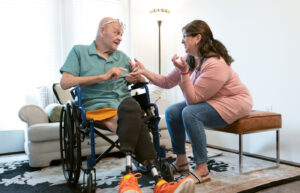This article delves into the significance of companion care, its benefits, and how it can enhance the quality of life for elderly individuals.
Understanding Companion Care
Companion care refers to non-medical support services that provide companionship, emotional support, and assistance with daily activities for elderly individuals. Unlike traditional home health care, which focuses primarily on medical needs, companion care emphasizes social interaction and engagement. This type of care is essential for seniors who may be experiencing loneliness or isolation, which can have detrimental effects on their mental and physical health.

Key Components of Companion Care
Companion care encompasses a variety of services tailored to meet the unique needs of seniors. These services often include:
- Social Interaction: Engaging in conversations, playing games, or participating in hobbies to combat loneliness.
- Emotional Support: Providing a listening ear and companionship to help alleviate feelings of isolation.
- Assistance with Daily Activities: Helping with meal preparation, light housekeeping, and transportation to appointments or social events.
- Monitoring Health: Keeping an eye on any changes in health or behaviour and communicating with family members or healthcare providers as needed.
By focusing on these components, companion care provides a holistic approach to supporting elderly individuals.

The Importance of Companion Care
Combating Loneliness
Loneliness is a significant issue among the elderly population.
👉🏻 According to the National Institute on Aging, nearly 30% of older adults live alone, leading to feelings of isolation.
Companion care plays a crucial role in alleviating loneliness by providing regular social interaction. Studies indicate that social engagement can improve mental health outcomes and overall well-being among seniors.
Research from AARP shows that social isolation can have serious health consequences, including increased risks of heart disease, depression, and cognitive decline. By offering companionship, caregivers help mitigate these risks and foster a sense of belonging.
Enhancing Mental Health
The mental health benefits of companion care are profound. Regular interaction with a caregiver can lead to improved mood and cognitive function. Research shows that seniors who engage in social activities experience lower levels of depression and anxiety.
👉🏻 A study published in the journal Psychology and Aging found that older adults who maintained strong social ties had better cognitive function compared to those who were isolated.
Companion caregivers provide not only companionship but also emotional support that can significantly enhance mental well-being. They encourage seniors to share their thoughts and feelings, helping them process emotions and cope with life’s challenges.

Supporting Physical Health
Companion care also supports physical health indirectly. Caregivers encourage seniors to participate in light physical activities, such as walking or stretching, which can enhance mobility and overall fitness.
Engaging in regular physical activity is essential for maintaining health as one ages, helping to prevent conditions like obesity, heart disease, and osteoporosis. Moreover, caregivers can assist with medication management, ensuring that seniors take their medications as prescribed.
This oversight is crucial for preventing complications from chronic conditions such as diabetes or hypertension.
Providing Peace of Mind for Families
For families concerned about their elderly loved ones living alone, companion care offers peace of mind. Knowing that a trained caregiver is present to provide companionship and assistance allows family members to focus on their own responsibilities without constant worry about their loved one’s safety and well-being.
👉🏻 The emotional burden on family caregivers can be significant. According to the Family Caregiver Alliance, nearly 50 million Americans provide unpaid care to an adult family member or friend.
This role can lead to stress, burnout, and even health issues for family caregivers themselves. By utilizing companion care services, families can alleviate some of this burden while ensuring their loved ones receive the support they need.

The Unique Challenges Faced by Seniors
As individuals age, they encounter various challenges that can affect their quality of life:
Health Issues
Chronic conditions such as arthritis or heart disease can limit mobility and independence. Many seniors face multiple health issues simultaneously, requiring careful management and support. Companion caregivers are trained to assist with daily tasks while being mindful of these health challenges.
Cognitive Decline
Conditions like Alzheimer’s disease may lead to confusion and memory loss. Seniors experiencing cognitive decline may struggle with daily routines or forget important appointments. Companion caregivers can provide reminders and help establish routines that promote independence while ensuring safety.
Social Isolation
Many seniors experience a decline in social networks due to retirement or loss of friends. The transition into retirement can be particularly challenging as individuals lose daily interactions with colleagues. Companion care addresses this issue by fostering new relationships through regular visits and activities.
Kizuna’s Approach to Companion Care
At Kizuna, we understand the importance of quality in caregiving. Our selective recruitment process ensures that only 10% of applicants are accepted as caregivers.
This rigorous vetting guarantees that families receive caregivers who are not only qualified but also genuinely committed to enhancing the lives of those they serve.
Our screening process includes:
- Background Checks: Comprehensive checks guarantee safety and reliability, including two reference checks and verification of caregiving credentials.
- Skill Assessments: Evaluating caregiving skills to match them with client needs.
- Personality Fit: Ensuring caregivers possess the right temperament for companionship roles.
By focusing on quality over quantity, Kizuna guarantees that families can trust that their loved ones are in capable hands.
5 Ways Companion Care Supports Elderly with Dementia
The Benefits of Choosing Kizuna for Companion Care
Personalized Care Plans
Every senior has unique needs and preferences. Kizuna works closely with families to develop personalized care plans that cater specifically to each individual’s requirements—whether it’s engaging in favourite activities or assisting with specific daily tasks.
Building Relationships
Companionship fosters meaningful relationships between caregivers and seniors. These bonds can lead to increased happiness and fulfilment for both parties, creating a supportive environment where seniors feel valued and understood.
Encouraging Independence
While providing necessary assistance, companion caregivers also encourage seniors to maintain as much independence as possible. This balance helps preserve dignity while ensuring safety.
Questions Families Should Consider When Choosing Companion Care
When selecting companion care services for an elderly loved one, families should consider several important questions:
- What specific needs does your loved one have?
- What qualities are most important in a caregiver?
- How often will caregiving services be required?
- What activities would your loved one enjoy doing with a caregiver?
- How will you communicate updates between caregivers and family members?
These questions can guide families in making informed decisions about companion care services.

More resources on Elder Car
Companion care is essential for promoting the well-being of elderly individuals. It provides not just assistance but also companionship that enriches lives through meaningful connections.
By choosing Kizuna, families ensure their loved ones receive exceptional care from dedicated professionals who understand the significance of companionship in improving overall quality of life.
As society continues to grapple with the challenges posed by an ageing population, it is crucial to recognize the transformative power of companion care. It is not merely about providing services; it is about enriching lives through genuine relationships built on trust and compassion.
Kizuna, discover how simple it is to find the best care.
More resources on elder care:
Reliable Companion Care Services for Your Loved Ones: Kizuna
Understanding Elder Care and Companion Care: Everything You Need to Know
How to Find Private Nursing Care In Home: Sonoma & Marin County
How Much Does 24/7 In-Home Care Cost Per Month



